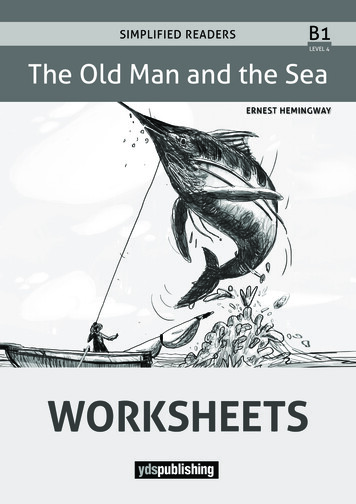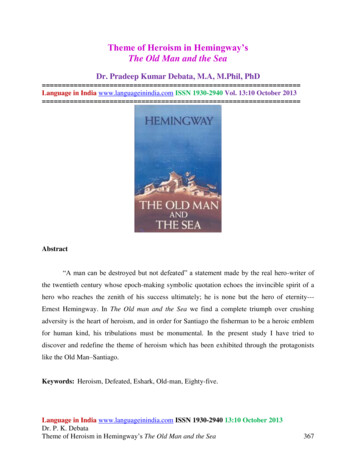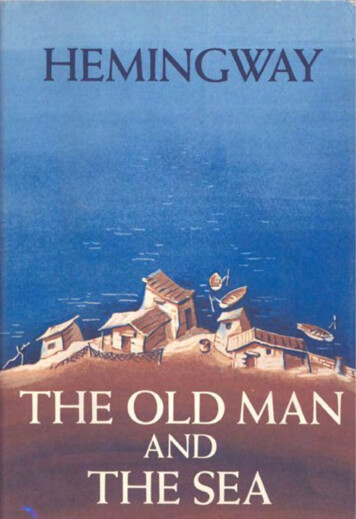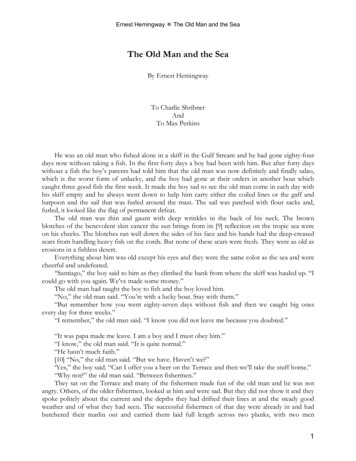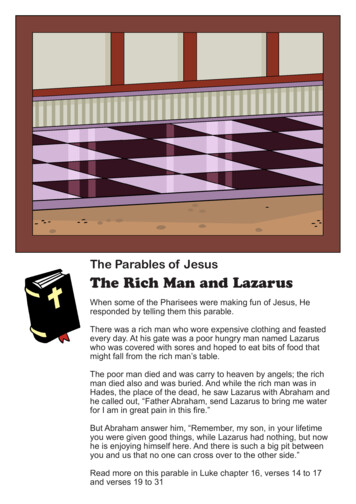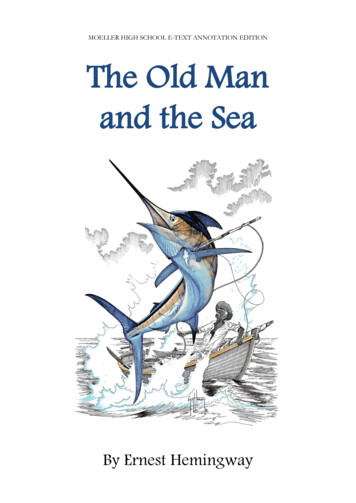
Transcription
MOELLER HIGH SCHOOL E-TEXT ANNOTATION EDITIONThe Old Manand the SeaBy Ernest Hemingway
THE OLD MAN AND THE SEAHe was an old man who fished alone in a skiff in the Gulf Stream andhe had gone eighty-four days now without taking a fish. In the first fortydays a boy had been with him. But after forty days without a fish the boy’sparents had told him that the old man was now definitely and finally salao,which is the worst form of unlucky, and the boy had gone at their orders inanother boat which caught three good fish the first week. It made the boysad to see the old man come in each day with his skiff empty and he alwayswent down to help him carry either the coiled lines or the gaff and harpoonand the sail that was furled around the mast. The sail was patched withflour sacks and, furled, it looked like the flag of permanent defeat.The old man was thin and gaunt with deep wrinkles in the back of hisneck. The brown blotches of the benevolent skin cancer the sun bringsfrom its reflection on the tropic sea were on his cheeks. The blotches ranwell down the sides of his face and his hands had the deep-creased scarsfrom handling heavy fish on the cords. But none of these scars were fresh.They were as old as erosions in a fishless desert.Everything about him was old except his eyes and they were the samecolor as the sea and were cheerful and undefeated.“Santiago,” the boy said to him as they climbed the bank from wherethe skiff was hauled up. “I could go with you again. We’ve made somemoney.”The old man had taught the boy to fish and the boy loved him.“No,” the old man said. “You’re with a lucky boat. Stay with them.”“But remember how you went eighty-seven days without fish and thenwe caught big ones every day for three weeks.”“I remember,” the old man said. “I know you did not leave me becauseyou doubted.”“It was papa made me leave. I am a boy and I must obey him.”“I know,” the old man said. “It is quite normal.”“He hasn’t much faith.”“No,” the old man said. “But we have. Haven’t we?”“Yes,” the boy said. “Can I offer you a beer on the Terrace and thenwe’ll take the stuff home.”“Why not?” the old man said. “Between fishermen.”They sat on the Terrace and many of the fishermen made fun of the oldman and he was not angry. Others, of the older fishermen, looked at himand were sad. But they did not show it and they spoke politely about thecurrent and the depths they had drifted their lines at and the steady goodweather and of what they had seen. The successful fishermen of that daywere already in and had butchered their marlin out and carried them laidfull length across two planks, with two men staggering at the end of eachplank, to the fish house where they waited for the ice truck to carry themto the market in Havana. Those who had caught sharks had taken them tothe shark factory on the other side of the cove where they were hoisted ona block and tackle, their livers removed, their fins cut off and their hidesskinned out and their flesh cut into strips for salting.When the wind was in the east a smell came across the harbour fromthe shark factory; but today there was only the faint edge of the odour2
THE OLD MAN AND THE SEAbecause the wind had backed into the north and then dropped off and itwas pleasant and sunny on the Terrace.“Santiago,” the boy said.“Yes,” the old man said. He was holding his glass and thinking of manyyears ago.“Can I go out to get sardines for you for tomorrow?”“No. Go and play baseball. I can still row and Rogelio will throw thenet.”“I would like to go. If I cannot fish with you. I would like to serve insome way.”“You bought me a beer,” the old man said. “You are already a man.”“How old was I when you first took me in a boat?”“Five and you nearly were killed when I brought the fish in too greenand he nearly tore the boat to pieces. Can you remember?”“I can remember the tail slapping and banging and the thwart breakingand the noise of the clubbing. I can remember you throwing me into thebow where the wet coiled lines were and feeling the whole boat shiver andthe noise of you clubbing him like chopping a tree down and the sweetblood smell all over me.”“Can you really remember that or did I just tell it to you?”“I remember everything from when we first went together.”The old man looked at him with his sun-burned, confident loving eyes.“If you were my boy I’d take you out and gamble,” he said. “But youare your father’s and your mother’s and you are in a lucky boat.”“May I get the sardines? I know where I can get four baits too.”“I have mine left from today. I put them in salt in the box.”“Let me get four fresh ones.”“One,” the old man said. His hope and his confidence had never gone.But now they were freshening as when the breeze rises.“Two,” the boy said.“Two,” the old man agreed. “You didn’t steal them?”“I would,” the boy said. “But I bought these.”“Thank you,” the old man said. He was too simple to wonder when hehad attained humility. But he knew he had attained it and he knew it wasnot disgraceful and it carried no loss of true pride.“Tomorrow is going to be a good day with this current,” he said.“Where are you going?” the boy asked.“Far out to come in when the wind shifts. I want to be out before it islight.”“I’ll try to get him to work far out,” the boy said. “Then if you hooksomething truly big we can come to your aid.”“He does not like to work too far out.”“No,” the boy said. “But I will see something that he cannot see such asa bird working and get him to come out after dolphin.”“Are his eyes that bad?”“He is almost blind.”“It is strange,” the old man said. “He never went turtle-ing. That is whatkills the eyes.”3
THE OLD MAN AND THE SEA“But you went turtle-ing for years off the Mosquito Coast and your eyesare good.”“I am a strange old man”“But are you strong enough now for a truly big fish?”“I think so. And there are many tricks.”“Let us take the stuff home,” the boy said. “So I can get the cast netand go after the sardines.”They picked up the gear from the boat. The old man carried the maston his shoulder and the boy carried the wooden boat with the coiled, hardbraided brown lines, the gaff and the harpoon with its shaft. The box withthe baits was under the stern of the skiff along with the club that was usedto subdue the big fish when they were brought alongside. No one wouldsteal from the old man but it was better to take the sail and the heavy lineshome as the dew was bad for them and, though he was quite sure no localpeople would steal from him, the old man thought that a gaff and aharpoon were needless temptations to leave in a boat.They walked up the road together to the old man’s shack and went inthrough its open door. The old man leaned the mast with its wrapped sailagainst the wall and the boy put the box and the other gear beside it. Themast was nearly as long as the one room of the shack. The shack was madeof the tough budshields of the royal palm which are called guano and in itthere was a bed, a table, one chair, and a place on the dirt floor to cookwith charcoal. On the brown walls of the flattened, overlapping leaves ofthe sturdy fibered guano there was a picture in color of the Sacred Heart ofJesus and another of the Virgin of Cobre. These were relics of his wife.Once there had been a tinted photograph of his wife on the wall but hehad taken it down because it made him too lonely to see it and it was onthe shelf in the corner under his clean shirt.“What do you have to eat?” the boy asked.“A pot of yellow rice with fish. Do you want some?”“No. I will eat at home. Do you want me to make the fire?”“No. I will make it later on. Or I may eat the rice cold.”“May I take the cast net?”“Of course.”There was no cast net and the boy remembered when they had sold it.But they went through this fiction every day. There was no pot of yellowrice and fish and the boy knew this too.“Eighty-five is a lucky number,” the old man said. “How would you liketo see me bring one in that dressed out over a thousand pounds?”“I’ll get the cast net and go for sardines. Will you sit in the sun in thedoorway?”“Yes. I have yesterday’s paper and I will read the baseball.”The boy did not know whether yesterday’s paper was a fiction too. Butthe old man brought it out from under the bed.“Perico gave it to me at the bodega,” he explained. “I’ll be back when Ihave the sardines. I’ll keep yours and mine together on ice and we canshare them in the morning. When I come back you can tell me about thebaseball.”“The Yankees cannot lose.”4
THE OLD MAN AND THE SEA“But I fear the Indians of Cleveland.”“Have faith in the Yankees my son. Think of the great DiMaggio.”“I fear both the Tigers of Detroit and the Indians of Cleveland.”“Be careful or you will fear even the Reds of Cincinnati and the WhiteSax of Chicago.”“You study it and tell me when I come back.”“Do you think we should buy a terminal of the lottery with an eightyfive? Tomorrow is the eighty-fifth day.”“We can do that,” the boy said. “But what about the eighty-seven ofyour great record?”“It could not happen twice. Do you think you can find an eighty-five?”“I can order one.“One sheet. That’s two dollars and a half. Who can we borrow thatfrom?”“That’s easy. I can always borrow two dollars and a half.”“I think perhaps I can too. But I try not to borrow. First you borrow.Then you beg.”“Keep warm old man,” the boy said. “Remember we are in September.”“The month when the great fish come,” the old man said. “Anyone canbe a fisherman in May.”“I go now for the sardines,” the boy said.When the boy came back the old man was asleep in the chair and thesun was down.The boy took the old army blanket off the bed and spread it over theback of the chair and over the old man’s shoulders. They were strangeshoulders, still powerful although very old, and the neck was still strong tooand the creases did not show so much when the old man was asleep andhis head fallen forward. His shirt had been patched so many times that itwas like the sail and the patches were faded to many different shades by thesun. The old man’s head was very old though and with his eyes closedthere was no life in his face. The newspaper lay across his knees and theweight of his arm held it there in the evening breeze. He was barefooted.The boy left him there and when he came back the old man was stillasleep.“Wake up old man,” the boy said and put his hand on one of the oldman’s knees.The old man opened his eyes and for a moment he was coming backfrom a long way away. Then he smiled.“What have you got?” he asked.“Supper,” said the boy. “We’re going to have supper.”“I’m not very hungry.”“Come on and eat. You can’t fish and not eat.”“I have,” the old man said getting up and taking the newspaper andfolding it. Then he started to fold the blanket.“Keep the blanket around you,” the boy said. “You’ll not fish withouteating while I’m alive.”“Then live a long time and take care of yourself,” the old man said.“What are we eating?”“Black beans and rice, fried bananas, and some stew.”5
THE OLD MAN AND THE SEAThe boy had brought them in a two-decker metal container from theTerrace. The two sets of knives and forks and spoons were in his pocketwith a paper napkin wrapped around each set.“Who gave this to you?”“Martin. The owner.”“I must thank him.”“I thanked him already,” the boy said. “You don’t need to thank him.”“I’ll give him the belly meat of a big fish,” the old man said. “Has hedone this for us more than once?”“I think so.”“I must give him something more than the belly meat then. He is verythoughtful for us.”“He sent two beers.”“I like the beer in cans best.”“I know. But this is in bottles, Hatuey beer, and I take back thebottles.”“That’s very kind of you,” the old man said. “Should we eat?”“I’ve been asking you to,” the boy told him gently. “I have not wishedto open the container until you were ready.”“I’m ready now,” the old man said. “I only needed time to wash.”Where did you wash? the boy thought. The village water supply was twostreets down the road. I must have water here for him, the boy thought,and soap and a good towel.Why am I so thoughtless? I must get him another shirt and a jacket forthe winter and some sort of shoes and another blanket.“Your stew is excellent,” the old man said.“Tell me about the baseball,” the boy asked him.“In the American League it is the Yankees as I said,” the old man saidhappily.”“They lost today,” the boy told him.“That means nothing. The great DiMaggio is himself again.”“They have other men on the team.”“Naturally. But he makes the difference. In the other league, betweenBrooklyn and Philadelphia I must take Brooklyn. But then I think of DickSisler and those great drives In the old park.”“There was nothing ever like them. He hits the longest ball I have everseen.”“Do you remember when he used to come to the Terrace?”“I wanted to take him fishing but I was too timid to ask him. Then Iasked you to ask him and you were too timid.”“I know. It was a great mistake. He might have gone with us. Then wewould have that for all of our lives.”“I would like to take the great DiMaggio fishing,” the old man said.“They say his father was a fisherman. Maybe he was as poor as we are andwould understand.”“The great Sisler’s father was never poor and he, the father, was playingin the Big Leagues when he was my age.”“When I was your age I was before the mast on a square rigged shipthat ran to Africa and I have seen lions on the beaches in the evening.”6
THE OLD MAN AND THE SEA“I know. You told me.”“Should we talk about Africa or about baseball?”“Baseball I think,” the boy said. “Tell me about the great John J.McGraw.” He said Jota for J.“He used to come to the Terrace sometimes too in the older days. Buthe was rough and harsh-spoken and difficult when he was drinking. Hismind was on horses as well as baseball. At least he carried lists of horses atall times in his pocket and frequently spoke the names of horses on thetelephone.”“He was a great manager,” the boy said. “My father thinks he was thegreatest.”“Because he came here the most times,” the old man said. “If Durocherhad continued to come here each year your father would think him thegreatest manager.”“Who is the greatest manager, really, Luque or Mike Gonzalez?”“I think they are equal.”“And the best fisherman is you.”“No. I know others better.”“Que Va,” the boy said. “There are many good fishermen and somegreat ones. But there is only you.”“Thank you. You make me happy. I hope no fish will come along sogreat that he will prove us wrong.”“There is no such fish if you are still strong as you say.”“I may not be as strong as I think,” the old man said. “But I knowmany tricks and I have resolution.”“You ought to go to bed now so that you will be fresh in the morning. Iwill take the things back to the Terrace.”“Good night then. I will wake you in the morning.”“You’re my alarm clock,” the boy said.“Age is my alarm clock,” the old man said. “Why do old men wake soearly? Is it to have one longer day?”“I don’t know,” the boy said. “All I know is that young boys sleep lateand hard.”“I can remember it,” the old man said. “I’ll waken you in time.”“I do not like for him to waken me. It is as though I were inferior.”“I know.”“Sleep well old man.”The boy went out. They had eaten with no light on the table and the oldman took off his trousers and went to bed in the dark. He rolled histrousers up to make a pillow, putting the newspaper inside them. He rolledhimself in the blanket and slept on the other old newspapers that coveredthe springs of the bed.He was asleep in a short time and he dreamed of Africa when he was aboy and the long golden beaches and the white beaches, so white they hurtyour eyes, and the high capes and the great brown mountains. He livedalong that coast now every night and in his dreams he heard the surf roarand saw the native boats come riding through it. He smelled the tar andoakum of the deck as he slept and he smelled the smell of Africa that theland breeze brought at morning.7
THE OLD MAN AND THE SEAUsually when he smelled the land breeze he woke up and dressed to goand wake the boy. But tonight the smell of the land breeze came very earlyand he knew it was too early in his dream and went on dreaming to see thewhite peaks of the Islands rising from the sea and then he dreamed of thedifferent harbours and roadsteads of the Canary Islands.He no longer dreamed of storms, nor of women, nor of greatoccurrences, nor of great fish, nor fights, nor contests of strength, nor ofhis wife. He only dreamed of places now and of the lions on the beach.They played like young cats in the dusk and he loved them as he loved theboy. He never dreamed about the boy. He simply woke, looked out theopen door at the moon and unrolled his trousers and put them on. Heurinated outside the shack and then went up the road to wake the boy. Hewas shivering with the morning cold. But he knew he would shiver himselfwarm and that soon he would be rowing.The door of the house where the boy lived was unlocked and heopened it and walked in quietly with his bare feet. The boy was asleep on acot in the first room and the old man could see him clearly with the lightthat came in from the dying moon. He took hold of one foot gently andheld it until the boy woke and turned and looked at him. The old mannodded and the boy took his trousers from the chair by the bed and, sittingon the bed, pulled them on.The old man went out the door and the boy came after him. He wassleepy and the old man put his arm across his shoulders and said, “I amsorry.”“Qua Va,” the boy said. “It is what a man must do.”They walked down the road to the old man’s shack and all along theroad, in the dark, barefoot men were moving, carrying the masts of theirboats.When they reached the old man’s shack the boy took the rolls of line inthe basket and the harpoon and gaff and the old man carried the mast withthe furled sail on his shoulder.“Do you want coffee?” the boy asked.“We’ll put the gear in the boat and then get some.”They had coffee from condensed milk cans at an early morning placethat served fishermen.“How did you sleep old man?” the boy asked. He was waking up nowalthough it was still hard for him to leave his sleep.“Very well, Manolin,” the old man said. “I feel confident today.”“So do I,” the boy said. “Now I must get your sardines and mine andyour fresh baits.He brings our gear himself. He never wants anyone to carry anything.”“We’re different,” the old man said. “I let you carry things when youwere five years old.”“I know it,” the boy said. “I’ll be right back. Have another coffee. Wehave credit here.”He walked off, bare-footed on the coral rocks, to the ice house wherethe baits were stored.The old man drank his coffee slowly. It was all he would have all dayand he knew that he should take it. For a long time now eating had bored8
THE OLD MAN AND THE SEAhim and he never carried a lunch. He had a bottle of water in the bow ofthe skiff and that was all he needed for the day.The boy was back now with the sardines and the two baits wrapped in anewspaper and they went down the trail to the skiff, feeling the pebbledsand under their feet, and lifted the skiff and slid her into the water.“Good luck old man.”Reading Assignment #2“Good luck,” the old man said. He fitted the rope lashings of the oarsonto the thole pins and, leaning forward against the thrust of the blades inthe water, he began to row out of the harbour in the dark. There wereother boats from the other beaches going out to sea and the old man heardthe dip and push of their oars even though he could not see them now themoon was below the hills.Sometimes someone would speak in a boat. But most of the boats weresilent except for the dip of the oars. They spread apart after they were outof the mouth of the harbour and each one headed for the part of the oceanwhere he hoped to find fish. The old man knew he was going far out andhe left the smell of the land behind and rowed out into the clean earlymorning smell of the ocean. He saw the phosphorescence of the Gulfweed in the water as he rowed over the part of the ocean that thefishermen called the great well because there was a sudden deep of sevenhundred fathoms where all sorts of fish congregated because of the swirlthe current made against the steep walls of the floor of the ocean. Herethere were concentrations of shrimp and bait fish and sometimes schoolsof squid in the deepest holes and these rose close to the surface at nightwhere all the wandering fish fed on them.In the dark the old man could feel the morning coming and as he rowedhe heard the trembling sound as flying fish left the water and the hissingthat their stiff set wings made as they soared away in the darkness. He wasvery fond of flying fish as they were his principal friends on the ocean. Hewas sorry for the birds, especially the small delicate dark terns that werealways flying and looking and almost never finding, and he thought, thebirds have a harder life than we do except for the robber birds and theheavy strong ones. Why did they make birds so delicate and fine as thosesea swallows when the ocean can be so cruel? She is kind and verybeautiful. But she can be so cruel and it comes so suddenly and such birdsthat fly, dipping and hunting, with their small sad voices are made toodelicately for the sea.He always thought of the sea as la mar which is what people call her inSpanish when they love her. Sometimes those who love her say bad thingsof her but they are always said as though she were a woman. Some of theyounger fishermen, those who used buoys as floats for their lines and hadmotorboats, bought when the shark livers had brought much money, spokeof her as el mar which is masculine. They spoke of her as a contestant or aplace or even an enemy. But the old man always thought of her as feminineand as something that gave or withheld great favours, and if she did wild orwicked things it was because she could not help them. The moon affectsher as it does a woman, he thought.9
THE OLD MAN AND THE SEAHe was rowing steadily and it was no effort for him since he kept wellwithin his speed and the surface of the ocean was flat except for theoccasional swirls of the current. He was letting the current do a third of thework and as it started to be light he saw he was already further out than hehad hoped to be at this hour.I worked the deep wells for a week and did nothing, he thought. TodayI’ll work out where the schools of bonito and albacore are and maybe therewill be a big one with them.Before it was really light he had his baits out and was drifting with thecurrent. One bait was down forty fathoms. The second was at seventy-fiveand the third and fourth were down in the blue water at one hundred andone hundred and twenty-five fathoms. Each bait hung head down with theshank of the hook inside the bait fish, tied and sewed solid and all theprojecting part of the hook, the curve and the point, was covered withfresh sardines. Each sardine was hooked through both eyes so that theymade a half-garland on the projecting steel. There was no part of the hookthat a great fish could feel which was not sweet smelling and good tasting.The boy had given him two fresh small tunas, or albacores, which hungon the two deepest lines like plummets and, on the others, he had a bigblue runner and a yellow jack that had been used before; but they were ingood condition still and had the excellent sardines to give them scent andattractiveness. Each line, as thick around as a big pencil, was looped onto agreen-sapped stick so that any pull or touch on the bait would make thestick dip and each line had two forty-fathom coils which could be madefast to the other spare coils so that, if it were necessary, a fish could takeout over three hundred fathoms of line.Now the man watched the dip of the three sticks over the side of theskiff and rowed gently to keep the lines straight up and down and at theirproper depths. It was quite light and any moment now the sun would rise.The sun rose thinly from the sea and the old man could see the otherboats, low on the water and well in toward the shore, spread out across thecurrent. Then the sun was brighter and the glare came on the water andthen, as it rose clear, the flat sea sent it back at his eyes so that it hurtsharply and he rowed without looking into it. He looked down into thewater and watched the lines that went straight down into the dark of thewater. He kept them straighter than anyone did, so that at each level in thedarkness of the stream there would be a bait waiting exactly where hewished it to be for any fish that swam there. Others let them drift with thecurrent and sometimes they were at sixty fathoms when the fishermenthought they were at a hundred.But, he thought, I keep them with precision. Only I have no luck anymore. But who knows? Maybe today. Every day is a new day. It is better tobe lucky. But I would rather be exact. Then when luck comes you areready.The sun was two hours higher now and it did not hurt his eyes so muchto look into the east. There were only three boats in sight now and theyshowed very low and far inshore.All my life the early sun has hurt my eyes, he thought. Yet they are stillgood. In the evening I can look straight into it without getting the10
THE OLD MAN AND THE SEAblackness. It has more force in the evening too. But in the morning it ispainful.Just then he saw a man-of-war bird with his long black wings circling inthe sky ahead of him. He made a quick drop, slanting down on his backswept wings, and then circled again.“He’s got something,” the old man said aloud. “He’s not just looking.”He rowed slowly and steadily toward where the bird was circling. Hedid not hurry and he kept his lines straight up and down. But he crowdedthe current a little so that he was still fishing correctly though faster than hewould have fished if he was not trying to use the bird.The bird went higher in the air and circled again, his wings motionless.Then he dove suddenly and the old man saw flying fish spurt out of thewater and sail desperately over the surface.“Dolphin,” the old man said aloud. “Big dolphin.”He shipped his oars and brought a small line from under the bow. Ithad a wire leader and a medium-sized hook and he baited it with one of thesardines. He let it go over the side and then made it fast to a ring bolt inthe stern. Then he baited another line and left it coiled in the shade of thebow. He went back to rowing and to watching the long- winged black birdwho was working, now, low over the water.As he watched the bird dipped again slanting his wings for the dive andthen swinging them wildly and ineffectually as he followed the flying fish.The old man could see the slight bulge in the water that the big dolphinraised as they followed the escaping fish.The dolphin were cutting through the water below the flight of the fishand would be in the water, driving at speed, when the fish dropped. It is abig school of dolphin, he thought. They are widespread and the flying fishhave little chance. The bird has no chance. The flying fish are too big forhim and they go too fast.He watched the flying fish burst out again and again and the ineffectualmovements of the bird. That school has gotten away from me, he thought.They are moving out too fast and too far. But perhaps I will pick up a strayand perhaps my big fish is around them.My big fish must be somewhere.The clouds over the land now rose like mountains and the coast wasonly a long green line with the gray blue hills behind it. The water was adark blue now, so dark that it was almost purple. As he looked down into ithe saw the red sifting of the plankton in the dark water and the strangelight the sun made now. He watched his lines to see them go straight downout of sight into the water and he was happy to see so much planktonbecause it meant fish. The strange light the sun made in the water, nowthat the sun was higher, meant good weather and so did the shape of theclouds over the land. But the bird was almost out of sight now and nothingshowed on the surface of the water but some patches of yellow, sunbleached Sargasso weed and the purple, formalized, iridescent, gelatinousbladder of a Portuguese man-of-war floating dose beside the boat.It turned on its side and then righted itself. It floated cheerfully as abubble with its long deadly purple filaments trailing a yard behind it in thewater.11
THE OLD MAN AND THE SEA“Agua mala,” the man said. “You whore.”From where he swung lightly against his oars he looked down into thewater and saw the tiny fish that were coloured like the trailing filaments andswam between them and under the small shade the bubble made as itdrifted. They were immune to its poison.But men were not and when same of the filaments would catch on aline and rest there slimy and purple while the old man was working a fish,he would have welts and sores on his arms and hands of the sort thatpoison ivy or poison oak can give. But these poisonings from the agua malacame quickly and struck like a whiplash.The iridescent bubbles were beautiful. But they were the falsest thing inthe sea and the old man loved to see the big sea turtles eating them. Theturtles saw them, approached them from the front, then shut their eyes sothey were completely carapaced and ate them filaments and all. The oldman loved to see the turtles eat them and he loved to walk on them on thebeach after a storm and hear them pop when he stepped on them with thehorny soles of his feet.He loved green turtles and hawk-bills with their elegance and speed andtheir great value and he had a friendly contempt for the huge, stupidloggerheads, yellow in their armour-plating, strange in their love-making,and happily eating the Portuguese men-of- war with their eyes shut.He had no mysticism about turtles although he had gone in turtle boatsfor many years. He was sorry for them all, even the great trunk backs thatwere as long as the skiff and weighe
The old man had taught the boy to fish and the boy loved him. "No," the old man said. "You're with a lucky boat. Stay with them." "But remember how you went eighty-seven days without fish and then we caught big ones every day for three weeks." "I remember," the old man said. "I know you did not leave me because you doubted."


